
Coconut dietary fiber, made from finely ground, dried and defatted coconut, provides a convenient way to increase your daily fiber intake without drinking a gelled or gritty beverage. Having many of the beneficial properties of other dietary fiber supplements, coconut dietary fiber also offers unique benefits to you and your plants, due to its lack of phytic acid and high water-absorption properties.
High Fiber
Coconut fiber has a higher fiber content, compared to other dietary fiber supplements. It contains four to six times the amount of fiber in oat bran and twice as much fiber as ground flaxseed or wheat bran. Dietary fiber promotes the movement of material through your digestive system, helping relieve and prevent constipation. It also helps lower your blood cholesterol and glucose levels.
Convenient
Simply adding a tablespoon of coconut fiber supplements to beverages, casseroles, soups or hot cereal, you can add a significant amount of fiber to your diet without making drastic dietary changes. You can even add coconut fiber to your homemade baked goods by replacing up to 20 percent of the wheat in a recipe with coconut fiber, without altering the taste. Coconut fiber has a very mild nutty taste that does not need to be covered up by sweetened drinks. Ground coconut fiber particles easily dissolve in liquids. Although coconut fiber has a high water-absorption capacity, it does not thicken or gel.
Gastrointestinal Benefits
A unique property found in coconut fiber is its ability to expel parasitic worms. A traditional Indian medicine practice, confirmed in a 1984 research study, indicates that eating coconut, particularly dried coconut containing coconut fiber, helps infected individuals expel parasitic tapeworms without toxic side effects. Additionally, coconut fiber contains natural medium chain triglycerides, which support the growth of beneficial bacterial in your intestines.
Increases Mineral Absorption
Many dietary fibers contain phytic acid. Phytic acid binds minerals in your digestive tract, which eventually expels the minerals from your body. Some of these minerals are essential for good health, including zinc, iron and calcium. Although health experts recommend increasing your dietary fiber, eating too much fiber containing phytic acid can cause mineral deficiencies. Unlike many fiber sources, coconut dietary fiber does not contain phytic acid and, therefore, does not remove minerals from the body. Not only does coconut fiber not remove minerals, but it also increases mineral absorption. Coconut fiber slows down the rate of emptying food from your stomach. This allows food more time in your stomach to release minerals, leading to higher levels of minerals available for your body to absorb.
Aids Plant Growth
Due to its hygroscopic, or water-absorbing properties, coconut fiber helps plants grow. It increases the water-absorbing power of potting soil, holds water in soil without any additives, and absorbs water evenly without beading. It protects against unwanted bacteria, promoting organic farming; has more nutrients than peat moss; has a neutral pH; and can remain effective for up to five years. As an amendment for clay soil, it loosens compact ground and resists compaction while increasing water retention. Coconut fiber has a high content of lignin and cellulose, component essential for growing plants that require cellulose-rich soils. It also has high levels of root-stimulating hormones that help protect against root disease and fungus infestation.
Highly Flammable
Coconut fiber belongs to the class of compounds known as flammable solids. It easily catches fire upon ignition, so keep external sources of potential ignition, such as sparks, matches and lit cigarettes, away from coconut fiber at all times. Spontaneous combustion may also occur due to self-heating. If coconut fiber ignites, use carbon dioxide or foam to extinguish the flames.
Related Articles
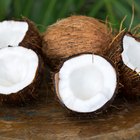
What Is the Nutrition in Coconuts & ...

The Benefits of Drinking Coconut Water
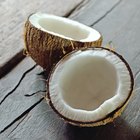
Uses of Coconut Fiber

Nutrients and Fiber in Coconut
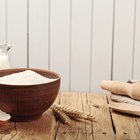
The Nutrition in Coconut Powder
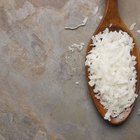
How to Toast Fresh Coconut

The Effects of Organic Fertilizer on ...
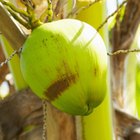
Health Advantages of Coconut Water

Can I Substitute Unsweetened Coconut ...
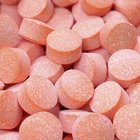
Benefiber Ingredients

Does Shredded Coconut Go Bad?
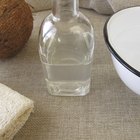
What Is Clear Liquid Coconut Oil?

How to Make Grapefruit Seed Extract
Baking With Almond, Rice & Coconut Flour

What Are the Advantages & Disadvantages ...

How to Make Calendula Tea
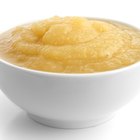
Benefiber as an Appetite Suppressant

Advantages of Vermicompost

Does Benefiber Lower Cholesterol?
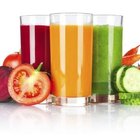
Nutrition Drinks for Diabetics
References
Resources
Writer Bio
Robin Wasserman has been writing and prosecuting biochemical patents since 1998. She has served as a biochemical patent agent and a research scientist for a gene-therapy company. Wasserman earned her Doctor of Philosophy in biochemistry and molecular biology, graduating from Harvard University in 1995.
Photo Credits
coconut image by Ivonne Wierink from Fotolia.com